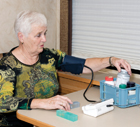
Hypertension in older adults — particularly in octogenarians — is much more common than in younger adults and more difficult to treat. Due to risk of complications and fear of increasing mortality, physicians often are hesitant to prescribe blood pressure-lowering medications in adults over 80.
Recent research, however, has found that blood pressure drugs are safer in this age group than previously thought. To clear up confusion, the American College of Cardiology and the American Heart Association have released new recommendations regarding which medications are safest and most effective for older adults, as well as guidance in identifying other non-drug treatments.
“Treating hypertension in the elderly is particularly challenging because they usually have several health problems and a greater prevalence of cardiovascular risk factors and cardiac events. There also needs to be greater vigilance to avoid treatment-related side effects such as electrolyte disturbances, renal dysfunction and excessive orthostatic blood pressure decline,” said Wilbert S. Aronow, M.D., one of the chairs of the ACC/AHA committee.
According to the guidelines, appropriate blood pressure drugs in very elderly adults are ACE inhibitors, beta-blockers, angiotensin receptor blockers, diuretics and calcium channel blockers. Doctors prescribing antihypertensive drugs for this age group should be sure to start at the lowest dose possible and titrate up, experts said.
From the June 01, 2011 Issue of McKnight's Long-Term Care News





